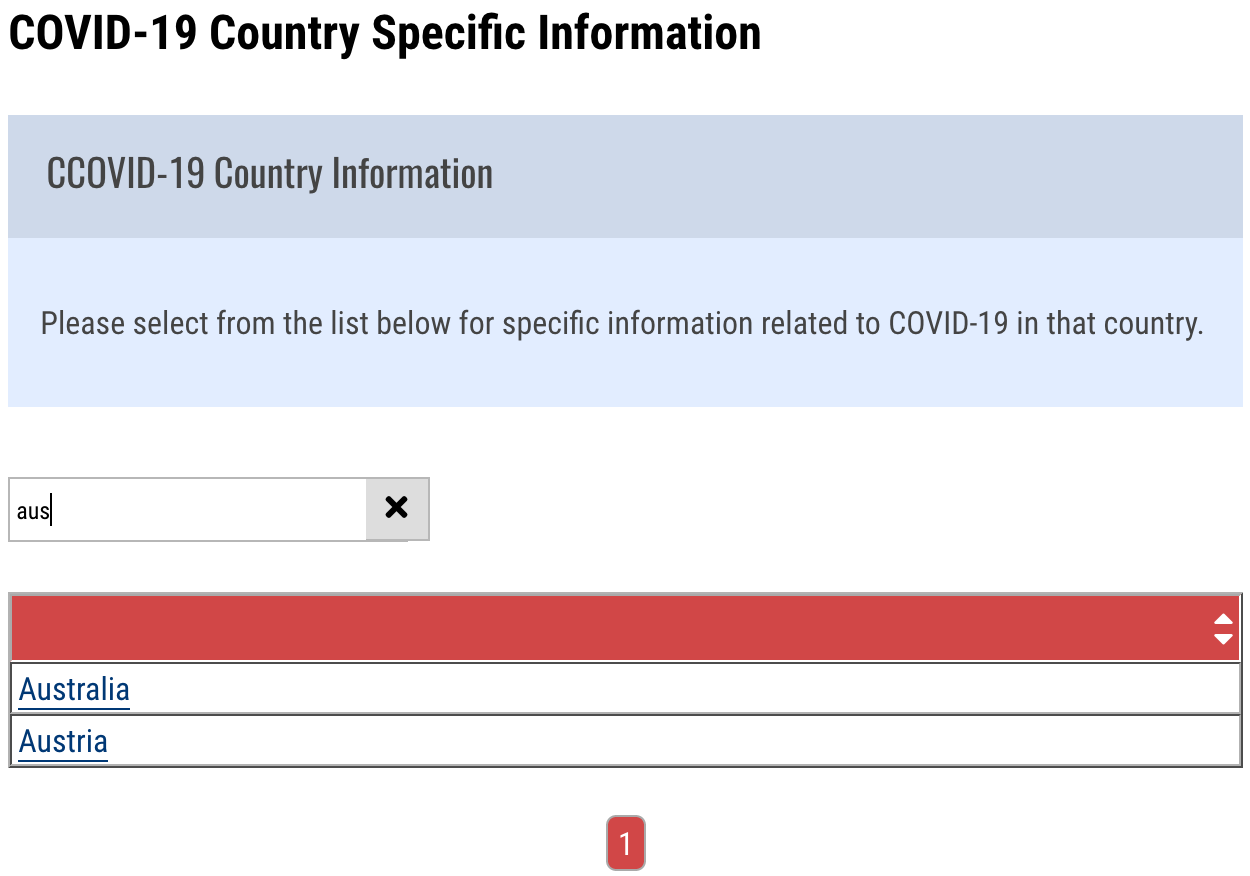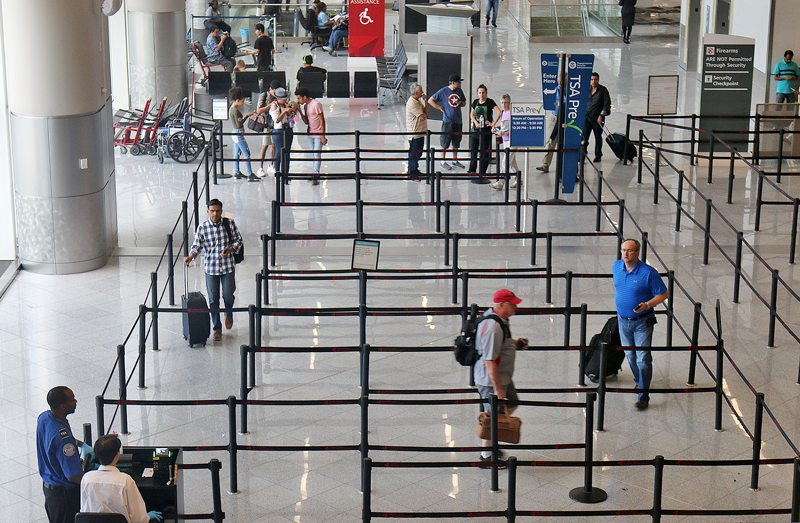Keeping up with the latest information pertaining to the 2019 Novel Coronavirus — which is also known as COVID-19 or 2019-nCoV — pandemic can be as daunting a task as the proverbial drink of water out of a fire hose at full power, as it either tends to change by the minute, or new information tends to be released…
2 Reliable Resources of Countries With Travel Entry Restrictions Due to 2019 Novel Coronavirus
…but keeping apprised of what are the latest restrictions pertaining to countries and territories worldwide is easier, thanks to two reliable sources. Which countries and territories have increased restrictions as to who is permitted entry? Which countries and territories have closed their borders off altogether, with the exception of citizens and nationals of the country or territory itself?
For example, a recent proposal from the European Union requested the suspension of all travel which is not essential from all countries and territories outside of the European Union — with the exception of the United Kingdom, which will still be permitted — to countries which are members of the European Union for 30 days.
Ursula von der Leyen — who is the president of the European Union — called on the aforementioned proposal on Monday, March 16, 2020.
The @EU_Commission presents guidelines on border measures & proposes:
1⃣Green lanes/fast lanes giving priority to essential transport to keep the mobility sector going & ensure economic continuity
2⃣Temporary restriction on non-essential travel to the EU (30 days) pic.twitter.com/9bda9MntF0
— Ursula von der Leyen (@vonderleyen) March 16, 2020
Keep in mind that the information is correct to the best of the knowledge of both of the following resources at the time of publication; and that information is reviewed and updated on an ongoing basis.
1. The Bureau of Consular Affairs of the Department of State of the United States
This official announcement was released yesterday, Sunday, March 22, 2020 from the Bureau of Consular Affairs of the Department of State of the United States pertaining to the 2019 Novel Coronavirus pandemic — and included in that announcement is this list of links to the official Internet web sites of embassies which have posted information with regard to their respective countries and territories, which can easily be filtered by entering text.

For example, if you type the letters AUS in the box located above the list, you will find that the list has been filtered to Australia and Austria, as shown in the image above.
Once the list has been filtered, click on the name of the country or territory to access the information about which you want or need to know.
The remainder of the aforementioned official announcement is as follows:
COVID-19 virus related emergency overseas?
Contact the nearest U.S. embassy or consulate, or call our assistance call center:
- From the U.S. & Canada – 1-888-407-4747
- From Overseas – +1 202-501-4444
- Enroll in STEP
The Department of State has no greater responsibility than the safety and security of U.S. citizens overseas, including providing information to help U.S. citizens make informed decisions about traveling abroad.
The Department of State advises U.S. citizens to avoid all international travel at this time due to the global impact of COVID-19. Many areas throughout the world are now experiencing COVID-19 outbreaks and taking action that may limit traveler mobility, including quarantines and border restrictions. Even countries, jurisdictions, or areas where cases have not been reported may restrict travel without notice.
For the latest information regarding COVID-19, please visit the Centers for Disease Control and Prevention’s (CDC) website.
Keeping workplaces, homes, schools, or commercial establishments safe.
On March 11, 2020, the World Health Organization determined the COVID-19 outbreak constitutes a pandemic.
Presidential Proclamations Regarding Novel Coronavirus
- On January 31 President Trump signed a proclamation barring entry to the United States of most foreign nationals who traveled to China within the past 14 days. Read the full text of the proclamation here.
- On February 29, President Trump signed a proclamation that expanded restrictions to include all aliens who were physically present within the Islamic Republic of Iran during the 14-day period preceding their entry or attempted entry into the United States. Read the full text of the proclamation here.
- On March 11, President Trump signed a proclamation that restricts travel to the United States from foreign nationals who have recently been in certain European countries. This does not apply to U.S. citizens or legal permanent residents. Read the full text of the proclamation here.
- On March 14, President Trump signed a proclamation that restricts travel to the United States from foreign nationals who have recently been in the United Kingdom and Ireland. This does not apply to U.S. citizens or legal permanent residents. Read the full text of the proclamation here.
U.S. Citizens Returning from Europe
U.S. citizens and legal permanent residents will be permitted to return from the United Kingdom, Ireland, and the European Schengen area. The Department of Homeland Security has issued instructions requiring U.S. passengers that have been in the United Kingdom, Ireland and the Schengen area to travel through select airports where the U.S. Government has implemented enhanced screening procedures. See the DHS website for further details.
U.S. citizens and legal permanent residents will be permitted to return from the United Kingdom, Ireland, and the European Schengen area. The Department of Homeland Security has issued instructions requiring U.S. passengers that have been in the United Kingdom, Ireland and the Schengen area to travel through select airports where the U.S. Government has implemented enhanced screening procedures. See the our FAQs on the Presidential Proclamation on travel from Europe and DHS website for further details.
The Schengen area encompasses the following 26 European countries: Austria, Belgium, Czech Republic, Denmark, Estonia, Finland, France, Germany, Greece, Hungary, Iceland, Italy, Latvia, Liechtenstein, Lithuania, Luxembourg, Malta, Netherlands, Norway, Poland, Portugal, Slovakia, Slovenia, Spain, Sweden, and Switzerland.
Please see our U.S. Travelers in Europe page for additional information on travel from the Schengen area.
U.S. Citizens Returning from China
Any U.S. citizen returning to the United States who has been in China in the previous 14 days may be subject to up to 14 days of quarantine.
Please read these Department of Homeland Security supplemental instructions for further details.
Cruise Ship Passengers
U.S. citizens, particularly travelers with underlying health conditions, should not travel by cruise ship at this time. CDC notes increased risk of infection of COVID-19 in a cruise ship environment. In order to curb the spread of COVID-19, many countries have implemented strict screening procedures that have denied port entry rights to ships and prevented passengers from disembarking. In some cases, local authorities have permitted disembarkation but subjected passengers to local quarantine procedures. While the U.S. government has evacuated some cruise ship passengers in recent weeks, repatriation flights should not be relied upon as an option for U.S. citizens under the potential risk of quarantine by local authorities. Cruise travelers should stay home for 14 days after returning from travel, monitor their health, and practice social distancing.
This is a fluid situation. CDC notes that older adults and travelers with underlying health issues should avoid situations that put them at increased risk for more severe disease. This entails avoiding crowded places, avoiding non-essential travel such as long plane trips, and especially avoiding embarking on cruise ships. Passengers with plans to travel by cruise ship should contact their cruise line companies directly for further information and continue to monitor the Travel.state.gov website and see the latest information from the CDC.
U.S. Students Abroad
The CDC recommends institutes of higher education (IHE) consider postponing or canceling upcoming student foreign exchange programs. In addition, CDC recommends IHE consider asking current program participants to return to their home country. Students abroad may face unpredictable circumstances, travel restrictions, and challenges in returning home or accessing health care while abroad.
2. Timatic — The International Air Transport Association.
The International Air Transport Association — which is more popularly known as IATA and is a trade association of airlines around the world — maintains a database of a list of countries and territories which contains the latest information pertaining to restrictions upon entry as a result of the 2019 Novel Coronavirus pandemic.
Timatic — which is an abbreviation for Travel Information Manual Automatic — is a database which contains requirements of documentation for passengers traveling internationally via airplane to countries and territories. Examples of those documents — which may be electronic or in the form of paper — are visas and passports; and the customs, health regulations, currency used, and airport information of the destination to which visitors want to travel may also be viewed.
Summary
Given the rapidly evolving nature of the international response to the 2019 Novel Coronavirus pandemic, neither the Bureau of Consular Affairs of the Department of State of the United States nor the International Air Transport Association nor The Gate can guarantee the accuracy of the information therein and therefore can accept no liability for any errors or omissions. The Bureau of Consular Affairs of the Department of State of the United States and the International Air Transport Association reserve the right to add or change information at any time.
Despite the comprehensiveness of the aforementioned databases, you should inquire about the latest information independently before relying on any information or materials contained within that database — or, for that matter, any information posted in articles here at The Gate.
I am doing the best that I can to relay to you factual information directly from the most reliable sources available in articles posted here at The Gate…
…but please keep in mind that I am only one person. The Gate does not have a team of employees dispatched in multiple offices worldwide; and so despite my best efforts working seven days per week, errors will unfortunately slip past me — especially with the rapid pace of new developments and information pertaining to the 2019 Novel Coronavirus pandemic. If you do find any errors in any of the articles which are posted here at The Gate, please let me know in a constructive and helpful manner.
Thank you for your understanding.
This article is the latest in a series pertaining to the 2019 Novel Coronavirus in an effort to get the facts out with information derived from reliable sources — as well as attempt to maintain a reasoned and sensible ongoing discussion towards how to resolve this pandemic.
Other articles at The Gate which pertain to the 2019 Novel Coronavirus include:
- Most Restaurants Now Offer Free Delivery. What About the Gratuity?
- Most Trusted Traveler Programs Enrollment Temporarily Suspended Due to 2019 Novel Coronavirus
- Where Can You Find Gasoline for 99 Cents Per Gallon in the United States?
- Have We Become a Society of Wimps Addicted to Drama?
- Four Overused Terms of the 2019 Novel Coronavirus Era
- Several Rental Car Companies Waive Young Adult Fees Due to 2019 Novel Coronavirus
- National Park Service Suspends All Entrance Fees Due To Coronavirus Pandemic
- Passport Services Delayed Beyond 8 Weeks; Expedited Passport Services Suspended Indefinitely
- Global Level 4 Health Advisory Issued by Department of State of the United States
- What is Wrong With This Photograph? Part 30: Coronavirus Edition
- Countries With Travel Entry Restrictions Due to 2019 Novel Coronavirus: An Updated Comprehensive List
- 2019 Novel Coronavirus: Should You Travel Within the United States?
- $250 Billion Bailout Requested by Lodging Companies
- Countries With Travel Entry Restrictions Due to 2019 Novel Coronavirus: A Comprehensive List
- $50 Billion Bailout Requested by Airlines; Trump to “Back the Airlines 100%”
- Global Level 3 Health Advisory Issued by Department of State of the United States
- All Domestic Travel Banned For Personnel of Department of Defense of the United States
- March 15 2020: Checking Back In on 2019 Novel Coronavirus — My Opinions, If Anyone Cares
- Hotel Deploys Robots to Sanitize and Disinfect Rooms
- Ireland and the United Kingdom Added to Suspension for Most Foreign Nationals For 30 Days From Europe to the United States
- Change Fee and Cancellation Fee Policies and Waivers of 46 Airlines Due To 2019 Novel Coronavirus
- Up to 12 Ounces of Hand Sanitizer is Permitted Through Airport Security Checkpoints
- I Swear, If I Receive One More Message About How My Health and Safety are Their Top Priority…
- Four Reliable Resources For Travel and the 2019 Novel Coronavirus
- Just Shut Down the Entire Planet. Problem Solved?
- Stop the Hyperbole: Travel is NOT Banned Between the United States and Europe…
- Travel From Europe to the United States Suspended for Most Foreign Nationals For 30 Days
- My Unproven Secret to Not Contracting a Virus in Years
- Pandemic of 2019 Novel Coronavirus Declared by World Health Organization
- Official Warning Issued Against Travel by Cruise Ship Due to 2019 Novel Coronavirus by the Department of State of the United States
- Now the Entire Country of Italy is Under Quarantine
- 16 Million People Quarantined in Northern Italy
- Are Masks Effective Against 2019 Novel Coronavirus That People are Stealing Them?
- As Many as 46,000 People May Have Died in the United States Alone From…
- Lodging Companies Issue Travel Waivers and Elite Status Extensions 2020 Due to 2019 Novel Coronavirus
- Update: More Airlines Suspended Change and Cancellation Fees 2020 Due To Coronavirus
- Airlines Which Suspended Change and Cancellation Fees 2020 Due To Coronavirus
- Should You Be Concerned About Coronavirus?
- Travel Alert February 2020: Italy Now Affected by 2019 Novel Coronavirus
- Travel Alert February 2020: Northern Italy Now Affected by 2019 Novel Coronavirus
- Travel Alert February 2020: South Korea Now Affected by 2019 Novel Coronavirus
- A Deal to Antarctica Because of 2019 Novel Coronavirus — But Hurry
- Update: Do Not Travel to China Due to 2019 Novel Coronavirus, Says United States Department of State
- Travel Alert January 2020: Hong Kong Now Affected by 2019 Novel Coronavirus
- Update January 2020: Additional Airlines Issue Travel Waivers for 2019 Novel Coronavirus
- Travel Alert January 2020: 2019 Novel Coronavirus Affecting Air Travel
Photograph ©2018 by Brian Cohen.

